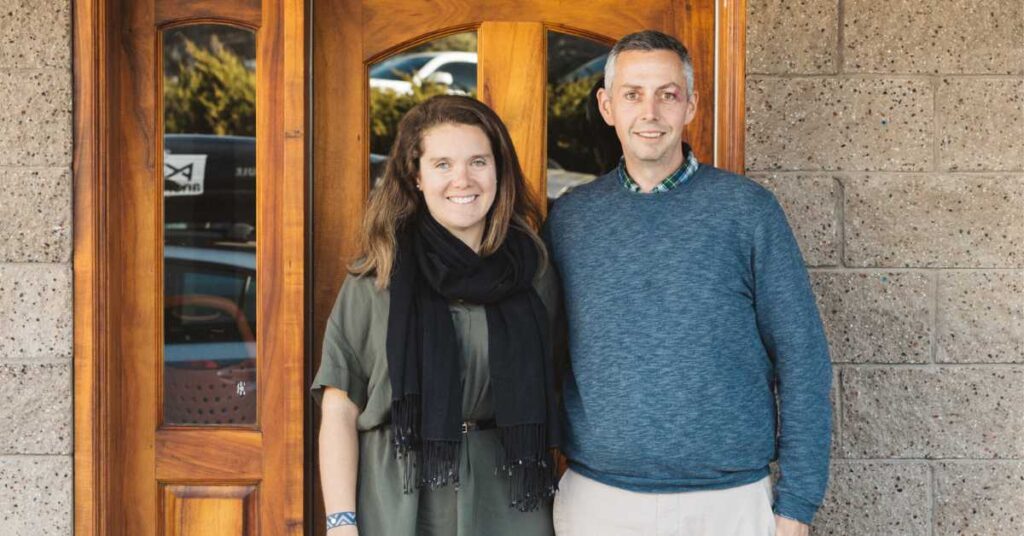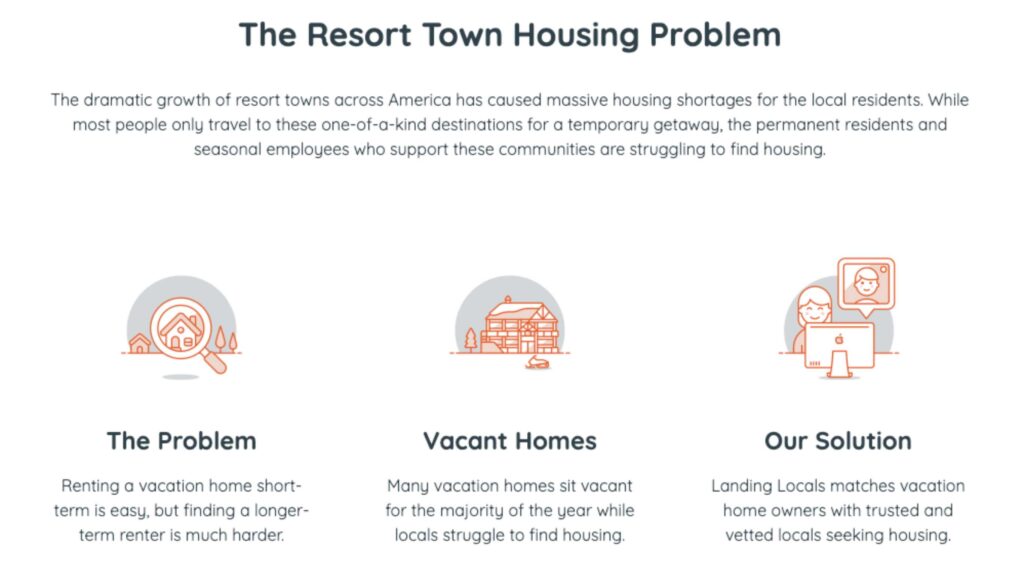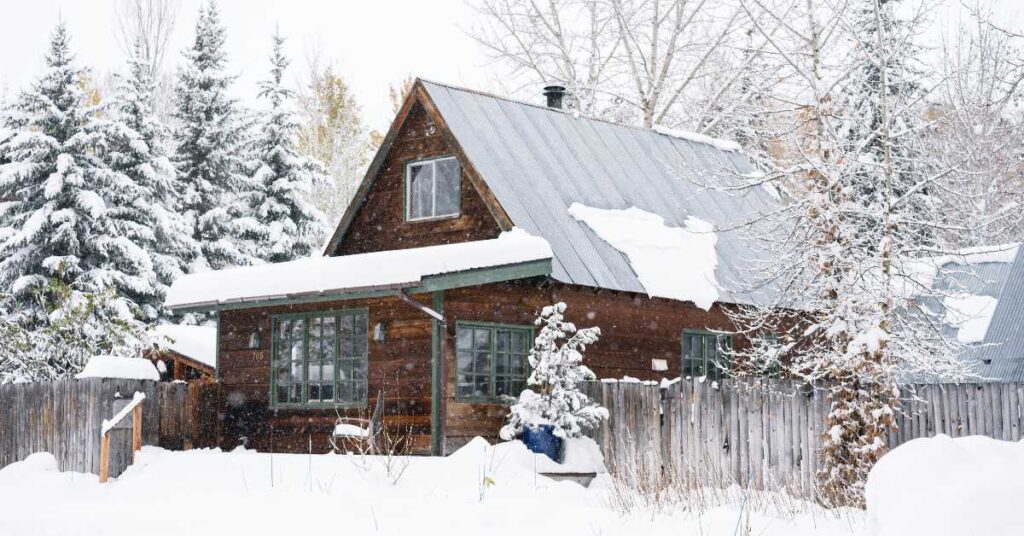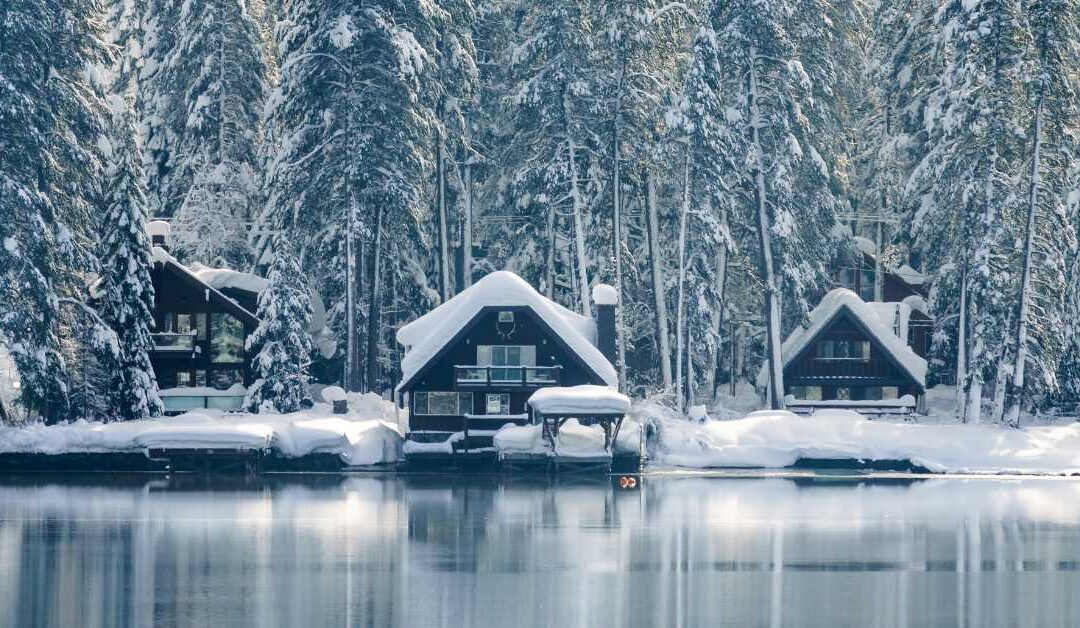More than half of the housing units in the mountain town of Truckee, California, are considered vacant, according to the 2020 Census, the most recent statistics available. The properties are largely second homes that sit empty when their owners aren’t staying there or vacation rentals that have guests for only part of the year.
Yet, many local workers who work in the service and ski industries cannot find housing, let alone affordable housing.
“Suddenly, there were no workers because no one had anywhere to live,” said Jenny Thompson, a ski instructor who lives in Truckee. “And then the people who did have money were like, ‘Oh, no, what are we going to do? Our favorite coffee shop is closing down.’ All these places aren’t open because they don’t have enough staff because the staff can’t find anywhere to live.”
Mountain towns and tourist destinations around the country – especially in the West – are facing similar scenarios.

Bridging the divide between empty homes and unhoused workers
But a unique startup called Landing Locals is beginning to bridge the divide between empty homes and the lack of workforce housing in Truckee and other mountain towns in the West.
Landing Locals finds owners of vacant or underutilized second homes and underperforming short-term rentals who are willing to consider longer-term leases and connects them with local workers who need housing. They also handle the screening of the tenant.
“Here’s an ecosystem of short-term rentals and tourism,” said Colin Frolich, co-founder and CEO of Landing Locals. “It needs long-term rentals and the workforce to survive; they need each other. We want to create a balance in tourism and peel off some of the short-term rentals and some of the empty second homes for the workforce.”

Colin and his wife, Kai Frolich, founded the company in March 2019 after relocating to Truckee from the San Francisco Bay Area and struggling to find a long-term rental.
Colin’s background is in tech. He worked at Airbnb and Lyft and was familiar with the vacation rental industry.
“I knew that the town of Truckee and the Tahoe area had a lot of housing stock in general,” Colin said. “What I didn’t quite realize was the sheer magnitude of the problems that existed for renters.”
Kai and Colin had been looking for a business venture that they could work on together.
“We wanted to work on an issue that was interesting and start a business together and do something related to the local community,” Colin said. “Our personal struggles of finding housing led us to think, well, what if we created the Airbnb for local workforce housing?”
“We thought, if we can play an intermediary between the renter and the business owner and build a trusted platform, it would be challenging, a big endeavor, but no one else is doing this.”

Responding to a critical need for workforce housing
The couple pitched the idea to the Community Foundation in the Truckee area and received a grant to help launch Landing Locals.
California’s mountain towns were hungry for such a service. The town of Truckee approached Kai and Colin to administer a monetary incentive program, called Lease to Locals, to boost participation by property owners and get them to commit to providing five- to 12-month leases to local workers.
“It’s not about taking anything away from anybody but just rebalancing and doing it in a very thoughtful and kind of surgical way,” Colin said. “That’s where the short-term rental ecosystem, the workforce, housing departments, and advocates for affordable housing could be working together, and that’s where we kind of bridge the gap.”
The program started in October 2020 in Truckee and has since expanded through local government contracts to South Lake Tahoe and North Lake Tahoe in California, Summit County and the town of Breckenridge in Colorado; and the Wood River Valley in Idaho, which includes the towns of Ketchum, Sun Valley, Bellevue, and Hailey.
Truckee offers an incentive of up to $18,000 to homeowners who participate and agree to cap rent to no more than $3,500 per month. The incentive amount depends on the length of the lease, which can range from five months to 12 months, and the number of workers who are on the lease.
Landing Locals recruits homeowners into the program through bulk mailing postcards with the city of Truckee’s logo on it, running ads in local newspapers, and offering information on the city’s website.
Finding underutilized second homes and vacation rentals
“The initial appeal was a little bit of tugging at the heartstrings: ‘You’ve got this thing that is sitting empty, and we’ve got a big housing problem. You can be part of the solution,’” Colin said, “and we’ll take some of the legwork out of this; we’ll build a mechanism to make it easy for you.”
A good chunk of the homes in the program came from recommendations from local property managers.
Lauren Kilbourne, a property manager at Tahoe Truckee Homes, has recommended multiple properties to Landing Locals. About 13 homes out of the 62 that she manages have at one point or another participated in the program.
“A lot of the homeowners we work with are totally supportive of the community and understand the need for the program,” Lauren said. “If we don’t have those workers, there are no services. That’s our bartenders, waitstaff, the people who work at the grocery store and the ski lifts. Not being able to house those people is detrimental to the community.”
“It helps everybody involved: It helps the homeowners, the local community, and the tenant,” Lauren said. “As a property manager or property owner, you feel like you’re actually doing a little bit of good for the community, too. You can dip your toe into the long-term market for a year and easily convert back if you want to.”
So far, the program has led to housing 181 workers and 42 children in 100 units with a capped monthly rent.
The city of Truckee stopped providing financial incentives to renew long-term leases, yet more than half of the homeowners have decided to continue to long-term rent without the additional subsidy, according to Landing Locals.
Win-win benefits for the community
Jenny is one of the workers who has benefited from the program.
She saw a Craigslist ad for a nice three-bedroom home with patio and view of the Truckee River for $3,500 and decided to apply for it with two friends who also work in the ski industry.
“I kept seeing the ad pop up, and honestly thought that it was a long shot that they would rent to a bunch of people in our 20s,” Jenny said. “We were kind of shocked when they were like, ‘No, you guys are exactly who we want to be renting to.’ We are really grateful to our landlords for being so open to housing a population that’s huge here and really needs housing, and it’s really hard to find it.”
Jenny’s landlord, James Donahue, a local residential real estate agent who has lived in Truckee for 16 years, heard about the Lease to Locals program from the local newspaper. “I thought Landing Locals was a great idea. I kind of wish I had come up with it,” James said.
At the time, he and his wife were in the process of buying a new house and planned to rent out the home they were living in. They contacted Landing Locals and signed up for the program. They signed a six-month lease with Jenny and her friends that started on Dec. 1. Jenny and three other friends split the rent four ways.
“The way I see it, everybody is happy; everybody benefits. It’s a win-win situation,” James said.
The strategy, subsidies, and rental caps for Lease to Locals differ by location, their unique housing makeup, and demographics. In Breckenridge, for example, Landing Locals focuses on owners of short-term rentals because a large portion of that town’s housing stock is short-term rentals.
The program is not intended to solve the housing shortage alone, but it’s a stopgap measure to give local governments more time to work on their affordable housing plan.
Inspiring future growth in Arizona and Montana
More than 60 other local governments have expressed interest and have the funding for the Lease to Locals programs, but as a small startup, Landing Locals doesn’t yet have enough employees to accommodate the demand. Instead, they provide informational resources for jurisdictions that want to start their own version of the program and administer it in-house. Sedona, Arizona, and Big Sky, Montana, are two examples of towns that have rolled out their own incentive programs inspired by the Lease to Locals program.
Colin and Kai recently relocated to Maine to be closer to family. In 2023, Lease to Locals plans to focus on new tourist markets on the East Coast and their new home state, which has the highest vacancy rate of homes, Colin said.
“We’re not trying to be like Uber and launch in every city in the world,” Colin said. “We’re trying to be thoughtful about the value we add.”
…
SUBSCRIBE TO GET UPDATES



